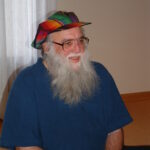The parasha for this week is Parashat Tazria, but it also Shabbat Ha’Chodesh, the week of the new moon of Nisan, the month of Pesach. The haftarah is from Ezekiel 45:16 – 46:18.
“By whatever gateway we enter the shmitah year, we must not go out again by the same gate. We must become a new people. Together with our respect for all the planetary life-forms, we must affirm a new respect for all people.”
This coming Shabbat is Shabbat Ha’Chodesh, the Sabbath of The Month, the renewing of the moon that Torah sees as the first “moonth” of the year. The rabbis who worked out the liturgical calendar wanted to choose a haftarah — a prophetic passage — to signal the coming of a week they called Pesach and Chag HaMatzot.
They found a passage by the Prophet Ezekiel that celebrated not only the New Moon but also the Festival of its fullness – a week focused on food when we would make a shepherds’ Pesach offering of a newborn lamb and eat Matzot, the farmers’ celebratory meal of just-sprouted, barley that we quickly baked into Unleavened Bread. A time of livelihoods renewed.
Notice that Ezekiel was following the pastoral-agrarian rhythm, not the explosive festival of liberation. This double festival celebrates the growth of spring and of the earliest human foods defined by controlling fire: roast lamb and baked, unflavored, unleavened bread.
“Pesach” was originally the dance of a newborn lamb, stumbling and skipping as it first learned to walk. Then ”Pesach” became the dance of shepherds celebrating the spring emergence of new lambs by imitating the lambs; then it named the sacred offering of such spring-born lambs to YHWH / Yahhh, the Breath of Life, and finally the skipping-over dance of the God Who skipped over the blood-smeared doors of the Israelites who celebrated their new birth through a doorway of blood—their own new womb.
Having set the tone for the “first month,” Ezekiel specifies rules for the observance of New Moons and Festivals in the new Temple that will replace the one the Babylonian army burned. The most profound of these rules is, “Whoever enters the north gate of the Temple to celebrate Yahh, the Interbreath of Life, shall leave by the south gate; and whoever enters by the south gate shall leave by the north gate. They shall not go back by the gate through which they came in” (Ezekiel 46:9). Once we enter a new spiritual experience, we must recognize that we leave as new persons.
Then, Ezekiel enters a different zone of sacred time — dror, a word that is used in Leviticus 25, the most detailed teaching about the seventh year of Shabbat Shabbaton, when Earth, animals, and humans must be allowed to rest. Both dror and shmitah mean Release.
And here Ezekiel, and the rabbis who arranged to read this passage – enter new “territory.” He examines how the Nasi, the king or powerful official, must not abuse his wealth. He may give gifts to his officials and supporters, but the gifts become his own again, or his children’s, when the dror – the seventh year, comes round. He may never rob the people of their holdings; only from his own personal holdings may he make gifts (Ez. 46:16-18).
This means that a certain degree of economic equality is part of the practice of shmitah/ dror. It means that a Nasi cannot build up a personal political following by bestowing gifts on his officials or his supporters, for the gifts are merely temporary. It means the Nasi may not punish the people or any group of them by impoverishing them, seizing their property.
We can combine the two passages I have singled out to mean that by whatever gateway we enter the sacred space-time of the shmitah year, we – the whole society — must not go out again by the same gate. For we must become a new people, a new society. Together with our respect for all the life-forms of Planet Earth, we must affirm a new respect for all the human beings around us – and especially for their livelihoods and a measure of economic equality with each other.
We can begin, we should begin, with the month of Passover, of new sustenance for shepherds and farmers and everyone else, of an Earth with no Pharaohs. Chodesh tov! – A new month of new good!
 Rabbi Arthur Waskow, Ph.D., is the founder (1983) and director of The Shalom Center and the initiator of ExodusAlliance.org, which aims to make Passover a festival to transform the future as well as celebrate the past. He is the author of 28 books, including the original Freedom Seder, Seasons of Our Joy, Earth and Justice Freedom-Seder, Liberating Your Passover Seder, and Dancing in God’s Earthquake, the harvest of his life-work.
Rabbi Arthur Waskow, Ph.D., is the founder (1983) and director of The Shalom Center and the initiator of ExodusAlliance.org, which aims to make Passover a festival to transform the future as well as celebrate the past. He is the author of 28 books, including the original Freedom Seder, Seasons of Our Joy, Earth and Justice Freedom-Seder, Liberating Your Passover Seder, and Dancing in God’s Earthquake, the harvest of his life-work.